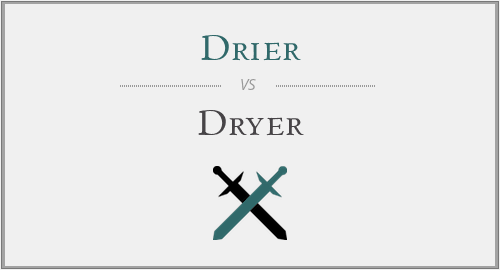Drier vs. Dryer: Navigating Variations in Spelling
Understanding the differences between "drier" and "dryer" involves recognizing variations in spelling and usage. This article aims to clarify the distinctions between "drier" and "dryer," shedding light on their meanings, applications, and appropriate usage in different contexts.
Correct Usage:
Drier:
"Drier" is the comparative form of the adjective "dry," used to indicate something that is less wet or has a lower level of moisture. It is often employed when comparing the moisture content of two or more items or substances.
Dryer:
"Dryer" is a noun that refers to a machine or apparatus designed to remove moisture by using heat or air circulation. It is commonly used in the context of laundry appliances or industrial processes that involve drying substances.
Meanings and Applications:
Drier:
Use "drier" when comparing the moisture level of two or more things, indicating that one is less wet than another. It functions as a comparative adjective in sentences like "This towel is drier than the one I used yesterday."
Dryer:
Use "dryer" when referring to a machine or device designed for removing moisture from items, such as clothes or dishes. It is a noun used to describe the appliance itself, as in "I need to put these wet clothes in the dryer."

Examples:
Correct: After the rain, the air became drier, and the sun emerged from behind the clouds.
Correct: She tossed the wet clothes into the dryer to have them ready for the evening.
Contextual Considerations:
Consider the context and the role of the word in the sentence. "Drier" is an adjective used for comparison, while "dryer" is a noun referring to a machine or device used for drying.
Conclusion:
Navigating the distinctions between "drier" and "dryer" involves understanding their roles as a comparative adjective and a noun, respectively. Whether comparing moisture levels or referring to a drying machine, using the appropriate term enhances clarity and precision in language use.




Have a discussion about this article with the community:
Report Comment
We're doing our best to make sure our content is useful, accurate and safe.
If by any chance you spot an inappropriate comment while navigating through our website please use this form to let us know, and we'll take care of it shortly.
Attachment
You need to be logged in to favorite.
Log In